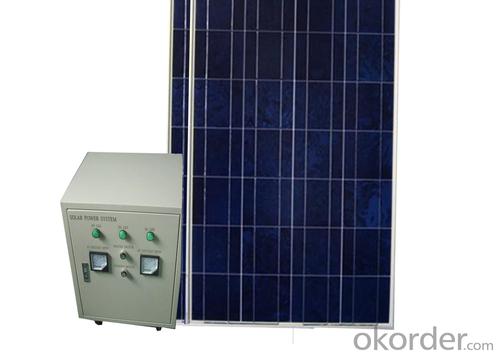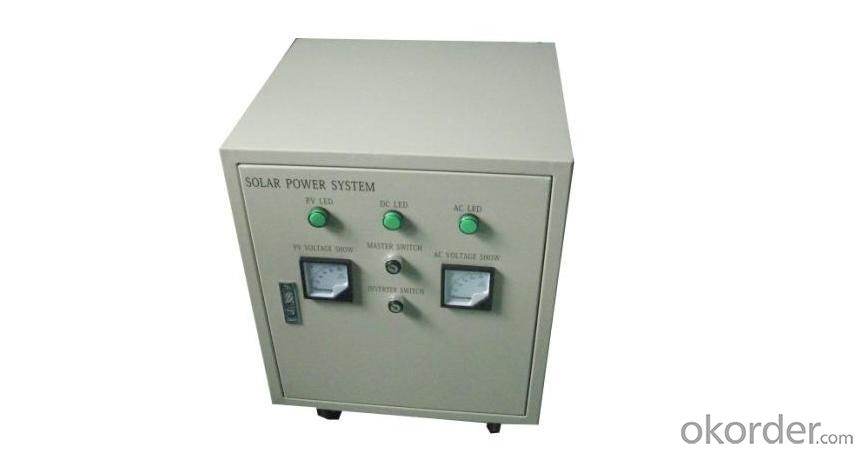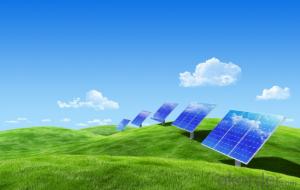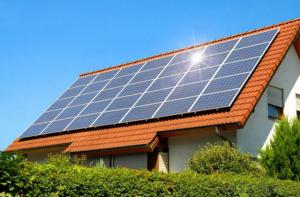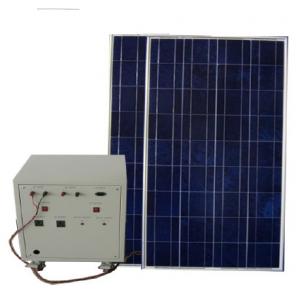Sunlight Solar Energy Systems CNBM-K4 (300W) Solar Home System
- Loading Port:
- China Main Port
- Payment Terms:
- TT or L/C
- Min Order Qty:
- 1 set set
- Supply Capability:
- 1000 sets per month set/month
OKorder Service Pledge
OKorder Financial Service
You Might Also Like
Brief Introduction of Solar Energy System CNBM-K4 (300W)
CNBM Home System-K4 (300W) has a wonderful capacity.It can be used in factory,home,school and other CNBM Home System-K4 (300W) consist of the solar modules,charge controller,inverter and battery banks.
CNBM International is highly recognized by its business partners and clients all over the world and has obtained rapid development under the spirit of win-win .
With CNBM Home System-K4 (300W),
We will carry on the mutual beneficial,innovative and revolutionary trading structure as we did before,create value for our employees,share holders and clients and benefit the whole society in our future development.Please contact us ,if you have interest in CNBM Home System-K4 (300W),don’t hesitate!
The Sketching of Solar Energy System CNBM-K4 (300W)
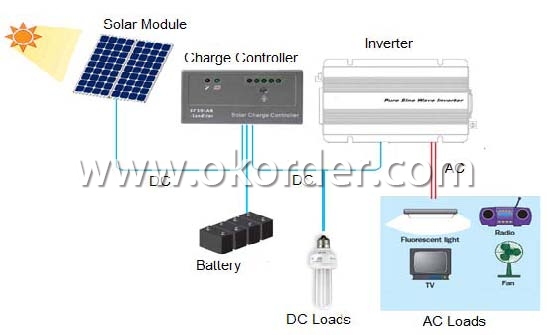
Components of Solar Energy System CNBM-K4 (300W)
PV Array:
Convert sunlight instantly into DC electric power. Formed by the solar modules (also called photovoltaic modules) in accordance with the system requirements for series and parallel.
Solar Charge Controller:
A charge controller may be used to power DC equipment with solar panels. The charge controller provides a regulated DC output and stores excess energy in a battery as well as monitoring the battery voltage to prevent over charge or over discharge. An inverter can be connected to the output of a charge controller to drive AC loads.
Inverter:
Converts DC output power of photovaltaic soalr panels into standard AC power for use in the local off-grid electrical network. It is a critical component in a photovoltaic system, allowing the use of ordinary commercial appliances.
Battery banks:
Stores energy when there is an excess coming in and distribute it back out when there is a demand. Solar PV panels continue to re-charge batteries each day to maintain battery charge.
Technical data of Solar Home System CNBM-K4 (300W) | ||
Inverter | Rated load power | 1000W |
Output wave | Pure sine wave | |
Output voltage | DC 24V | |
Output frequency | DC:12V AC:220V | |
Precision of output | 50HZ/60HZ | |
Precision of output frequency | ±6% | |
Solar panel | Pmax | 150W*2PCS |
Vmp | 18V*2 | |
Imp | 8.34A | |
Charger | Charger voltage & current | 24V 20A |
Battery | Capacity | 12V 80AH*2PCS |
Power box | Spray paint iron box,with input,output,ammeter,voltmeter,master swith and so on. | |
Package of Solar Home System CNBM-K4 (300W) | ||||
Part | Size(L*W*H mm) | Weight(kg) | 20’(pcs) | 40’(pcs) |
Power box | 580*520*540 | 60 | 84 Sets | 200 Sets |
Solar panel | 1500*700*90 | 24 | ||
Battery | 270*340*220 | 50 | ||
Factory Picture of Solar Energy System CNBM-K4 (300W)
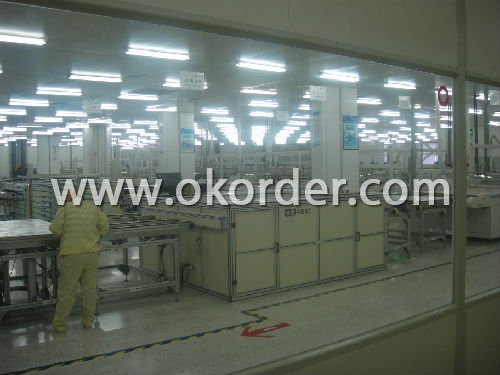
Package Picture of Solar Energy System CNBM-K4 (300W)
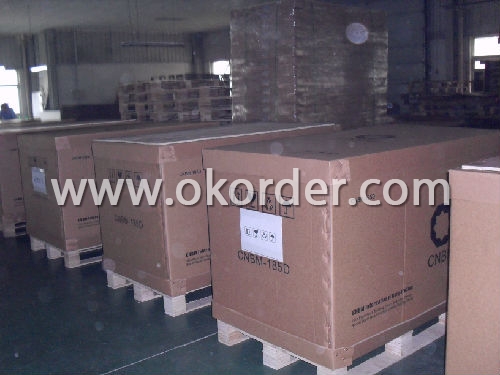
- Q: What are the devices needed for PV systems?
- Solar photovoltaic power generation system is mainly composed of solar cell matrix, controller, battery, inverter and other equipment
- Q: Can solar energy systems be used in areas with limited access to solar panel manufacturers?
- Yes, solar energy systems can still be used in areas with limited access to solar panel manufacturers. In such cases, it may be necessary to import solar panels from manufacturers located elsewhere or explore alternative options such as portable solar panels or solar kits. Additionally, local manufacturing capabilities can be developed gradually to meet the demand for solar panels in the area.
- Q: Are there any risks of electromagnetic interference with solar energy systems?
- Yes, there are potential risks of electromagnetic interference with solar energy systems. Electromagnetic interference can be caused by nearby equipment or power lines, which can disrupt the proper functioning of solar panels and inverters. This interference can result in reduced energy production, impaired system performance, or even complete failure. To mitigate these risks, proper system design, installation, and grounding techniques should be employed to minimize the impact of electromagnetic interference on solar energy systems.
- Q: Can solar energy systems be used in areas with high levels of dust?
- Yes, solar energy systems can be used in areas with high levels of dust. While dust can potentially reduce the efficiency of solar panels, it is still possible to generate electricity from sunlight. Regular cleaning and maintenance of the solar panels can help mitigate the impact of dust on their performance. Additionally, advancements in solar panel technology, such as anti-soiling coatings and self-cleaning mechanisms, have made it easier to maintain their efficiency in dusty environments. However, it is important to note that the effectiveness of solar energy systems in dusty areas may vary depending on the severity and type of dust present.
- Q: Can solar energy systems be used for street lighting?
- Yes, solar energy systems can be used for street lighting. Solar street lights are becoming increasingly popular as they are more energy-efficient, cost-effective, and environmentally friendly compared to traditional street lights. They rely on solar panels to convert sunlight into electricity, which is then stored in batteries and used to power the street lights during the night. This renewable energy solution reduces reliance on the grid and helps to reduce carbon emissions.
- Q: Can solar energy systems be installed on vehicles?
- Yes, solar energy systems can be installed on vehicles. These systems typically consist of solar panels that capture sunlight and convert it into electricity, which can be used to power various components of the vehicle. Solar energy systems on vehicles are commonly found on electric cars, RVs, boats, and even bicycles, providing a sustainable and renewable source of power for charging batteries or running appliances.
- Q: Can solar energy systems be used in areas with limited access to healthcare facilities?
- Yes, solar energy systems can be used in areas with limited access to healthcare facilities. Solar energy can power medical equipment, refrigeration systems for vaccines and medicines, and lighting in healthcare facilities, allowing them to function even in remote areas without reliable access to electricity. This can greatly improve healthcare services and enable the delivery of essential medical care, diagnostics, and treatments in underserved communities.
- Q: Can solar energy systems be used during power outages?
- Yes, solar energy systems can be used during power outages, as long as they are equipped with battery storage. The batteries store excess solar energy generated during the day, allowing it to be used at night or during power outages. This provides a reliable source of electricity even when the grid is down.
- Q: Can solar energy systems be used in powering agricultural processing facilities?
- Yes, solar energy systems can be used to power agricultural processing facilities. Solar energy systems, such as photovoltaic (PV) panels, can generate electricity from sunlight, which can then be used to power various electrical equipment and processes in agricultural processing facilities. This can include powering machinery used for cleaning, sorting, and packaging agricultural products, as well as running heating, ventilation, and air conditioning systems. Solar energy systems can also be integrated with battery storage solutions to provide a reliable and continuous power supply, even during periods of low sunlight or at night. Additionally, using solar energy to power agricultural processing facilities can help reduce reliance on fossil fuels, lower greenhouse gas emissions, and contribute to a more sustainable and environmentally friendly operation.
- Q: How do solar energy systems store excess energy?
- Solar energy systems store excess energy through the use of batteries or other energy storage technologies. This allows the surplus energy generated by the system during periods of high sunlight to be stored and used later when sunlight is not available, such as at night or during cloudy days.
Send your message to us
Sunlight Solar Energy Systems CNBM-K4 (300W) Solar Home System
- Loading Port:
- China Main Port
- Payment Terms:
- TT or L/C
- Min Order Qty:
- 1 set set
- Supply Capability:
- 1000 sets per month set/month
OKorder Service Pledge
OKorder Financial Service
Similar products
Hot products
Hot Searches
Related keywords



